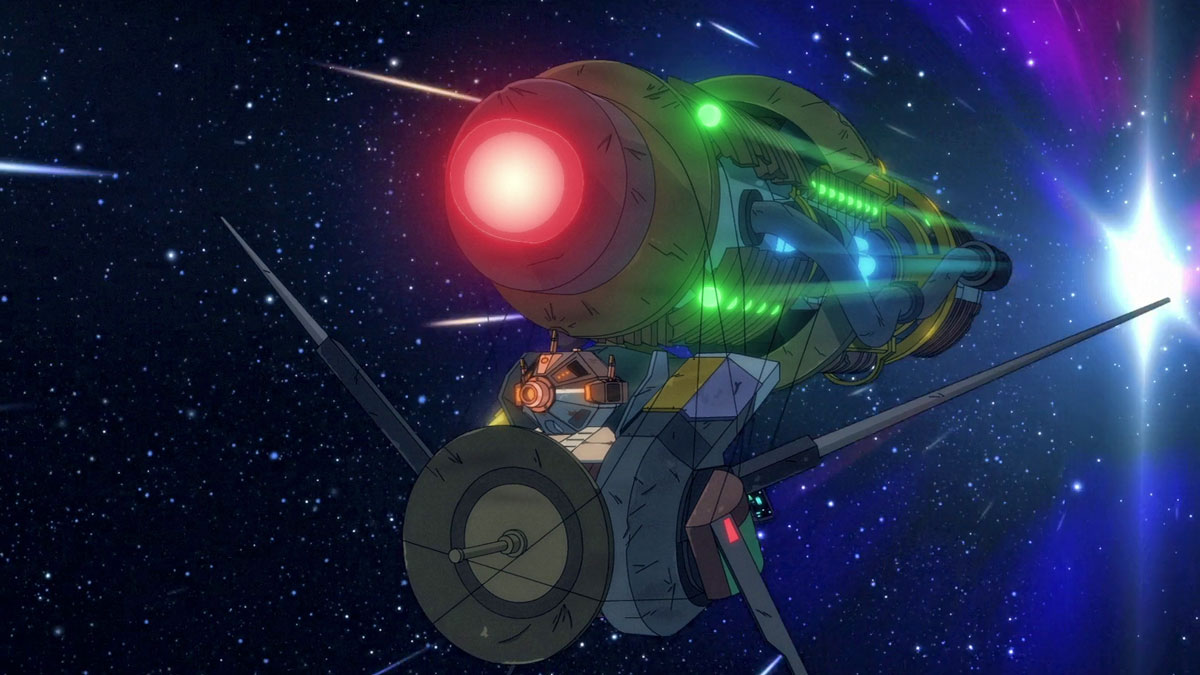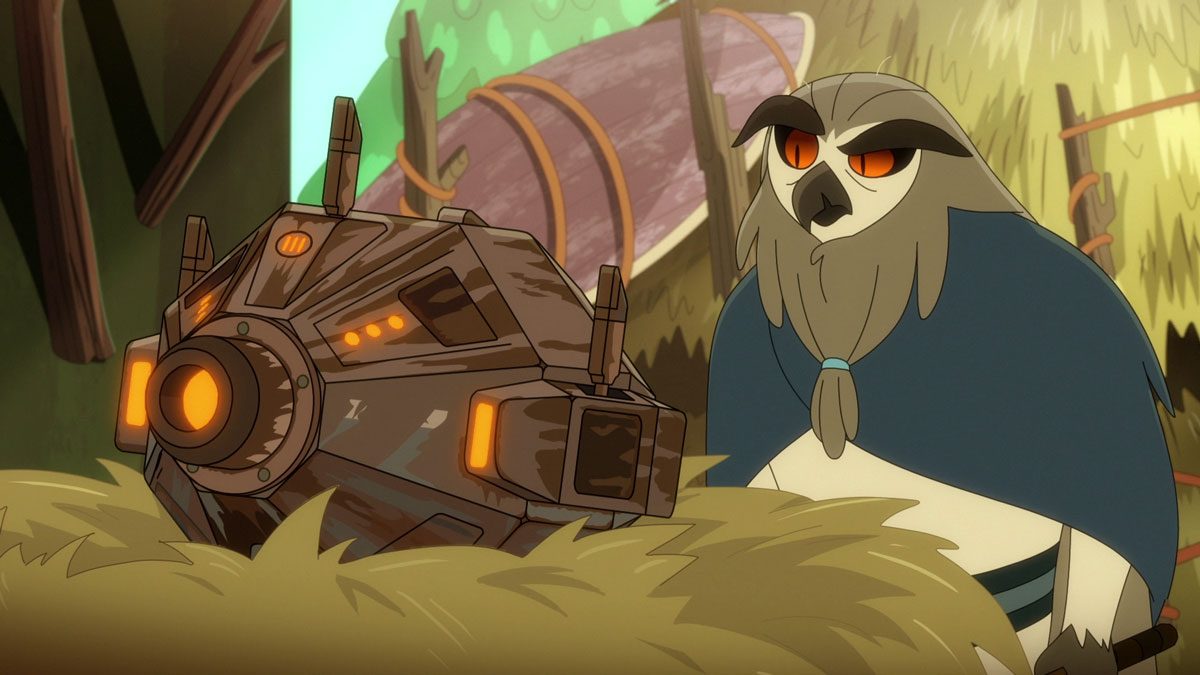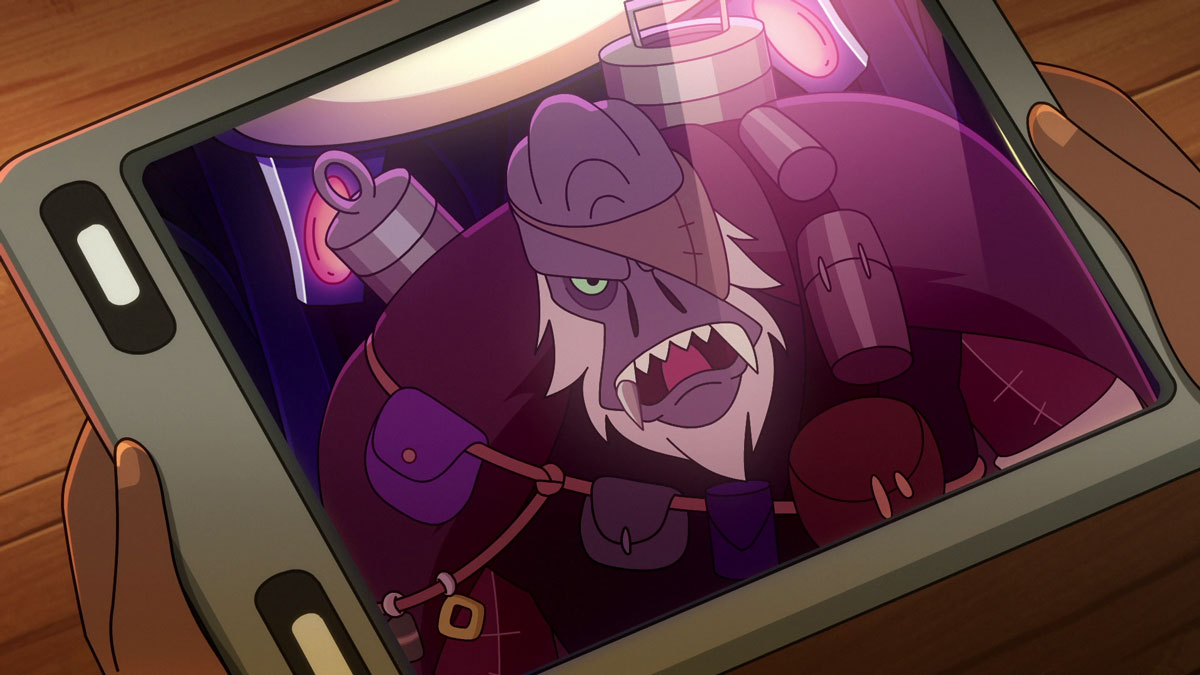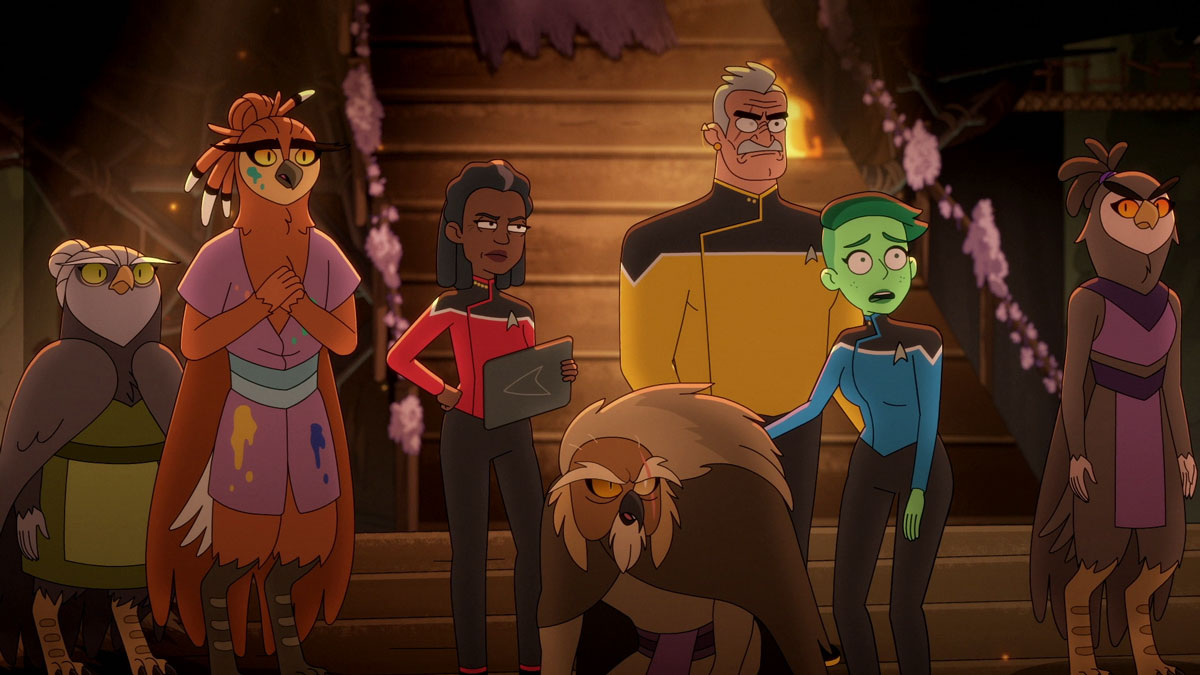“A Mathematically Perfect Redemption” is the most experimental episode of Star Trek: Lower Decks to date, going even further than last season’s “wej Duj” in de-emphasizing the Cerritos crew to focus on exploring Lower Deckers of all stripes. But where “wej Duj” focused on heroic Lower Deckers on other ships, this episode focuses on one particular Lower Decker that we’ve had the unfortunate privilege to meet before — Peanut Hamper.
Yes, this week is literally an all-Peanut Hamper episode, following the narcissistic ensign’s adventures after the Exocomp abandoned the Cerritos to their fate at the hands of the Pakleds in “No Small Parts,” left behind after the Titan saved the day in the Season 1 finale.
Engineering her escape from the Pakled debris field and crash landing on the planet Areolus, Peanut Hamper (Kether Donohue) finds herself among a pre-warp civilization of avian people, where she tries to fit in and plan her future.
I enjoyed “A Mathematically Perfect Redemption” a lot, because I enjoy experimental episodes of Star Trek. After nearly 900 episodes, I think it’s okay — and even encouraged — for Star Trek to take risks and try something different, and this episode certainly does that. But I think it is likely to be a bit divisive among fans: I think you’re either going to love this one, or you’re going to hate it. And given what a departure it is from the normal flow and tenor of an episode of Lower Decks, you can’t necessarily fault either reaction.
But for me, I really enjoyed this side trip away from the Cerritos. Peanut Hamper really is an irredeemable narcissist, and Kether Donohue turns in a delicious performance that reflects the many different shades of the Exocomp’s self-serving personality. Donohue, and the script from writer Ann Kim, were also good enough to make me genuinely believe that Peanut Hamper had turned over a new leaf… until it was revealed that she had not.
Areolus and the bird-like people who populate it, the Areore, are faintly ridiculous, but most importantly for an episode like this, they’re also a lot of fun. For example, it’s funny that all the animals on the planet have wings. And the culture and tradition of the Areore are amusing in the sense that there are a lot of bird jokes in this episode.
But most importantly, they end up being a little more interesting than they appear on the surface — and when it is revealed that the Areore used to have starships but chose to abandon technology for a simpler life, they do become a genuinely interesting culture.
“A Mathematically Perfect Redemption” also keeps up the recent streak of Lower Decks revisiting its own characters and concepts and deepening them further. There’s Peanut Hamper of course, but but the reappearance of J.G. Hertzler’s Drookmani captain and Jeffrey Combs’s egomaniacal AGIMUS computer are also welcome returns.
And where the episode ends — with Peanut Hamper confined to the Self-Aware Meglamoanical Computer Storage facility at the Daystrom Institute — portends the possibility of future appearances, and more Jeffrey Combs.
And combined with last week’s “Hear All, Trust Nothing,” I can only state in awe that the animation for this show continues to impress so much. From the gorgeous opening title sequence of the Pakled debris field to the starship battle at the end of the episode, the Lower Decks animators are turning in absolutely spectacular and gorgeous work.
TREK TROPE TRIBUTES
- The episode opens with a classic Previously on Star Trek: Lower Decks… in a clear homage to the Berman era of Star Trek and to the dearly departed Majel Barrett Roddenberry.
CANON CONNECTIONS
- We see Peanut Hamper use her mini-replicator built into her nose a number of times, which allows her to replicate different appendages to complete tasks, including various tools and a hypospray.
- Rawda tells Peanut Hamper that his ancestors could “travel great distances by making the stars fold upon themselves,” which Peanut Hamper quickly points out is describing warp travel. We rarely hear on Star Trek the physics of warp travel explained.
- The winged turtle-birds of Areolus were previously seen in the aviary on Starbase 25.
- J.G. Hertzler reprises his role as the Drookmani captain, introduced in “Terminal Provocations.”
- Peanut Hamper pulls out the famous Spock line from Star Trek II: The Wrath of Khan in explaining that “the needs of the many outweigh the needs of the few” as she volunteers to try and sabotage the Drookmani ship.
- Peanut Hamper describes the Areore as the “poor man Aurelians,” referring to the bird-like species introduced in “Yesteryear” and recently seen again in “An Embarrassment of Dooplers.”
- She also says she should have reached out to the Borg instead of Starfleet, which probably would have ended even worse.
- Jeffrey Combs reprises his role as AGIMUS, introduced in “Where Pleasant Fountains Lie.”
OTHER OBSERVATIONS
- For the first time, the series skips the traditional opening title sequence – instead presenting the credits over a solemn montage of Peanut Hamper floating through the debris field.
- It’s cool to get some alternative views of the ending of “No Small Parts,” from Peanut Hamper’s perspective, including the Titan locking its tractor beam onto the Cerritos.
- Peanut Hamper’s inanimate companion Sophia is clearly an homage to Wilson from the Tom Hanks movie Cast Away. But where Hanks’ character mourns Wilson’s loss, Peanut Hamper immediately jettisons Sophia when it’s in her interests — perhaps a clue of things to come!
- The Areore present an interesting Prime Directive case about which that the episode only scratches: a race whose ancestors had warp technology, but chose to abandon, such that the current descendants are unaware of the existence of aliens or advanced technology. It feels like they are not breaking the Prime Directive on a technicality!
Overall, “A Mathematically Perfect Redemption” was a fun and experimental episode of Lower Decks that featured some great performances and some very funny moments. Peanut Hamper is an out and out villain, and so just to choose to focus an episode directly on one of the show’s villains was a bold choice.
I expect this won’t be as well loved as the near-perfect “wej Duj,” and that there may even be some people who don’t like this episode at all, but Lower Decks likes to take a big swing each season, and “A Mathematically Perfect Redemption” is the biggest swing of all.
Keep swinging, Lower Decks!
![]()
Star Trek: Lower Decks returns with “Crisis Point 2: Paradoxus” on Thursday, October 13 on Paramount+ in the United States, Australia, Latin America, and the Nordics, as well as on CTV Sci Fi Channel in Canada and on Prime Video in many other regions.






